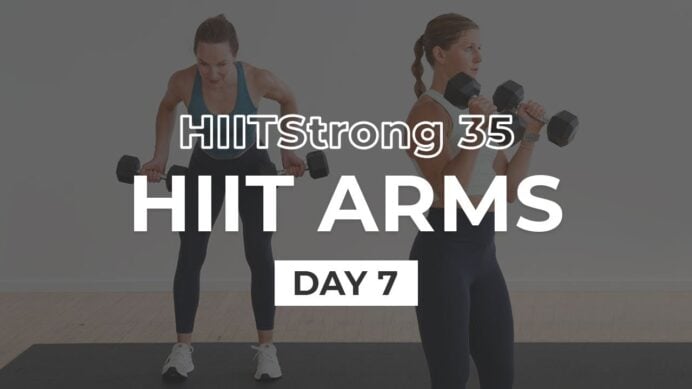
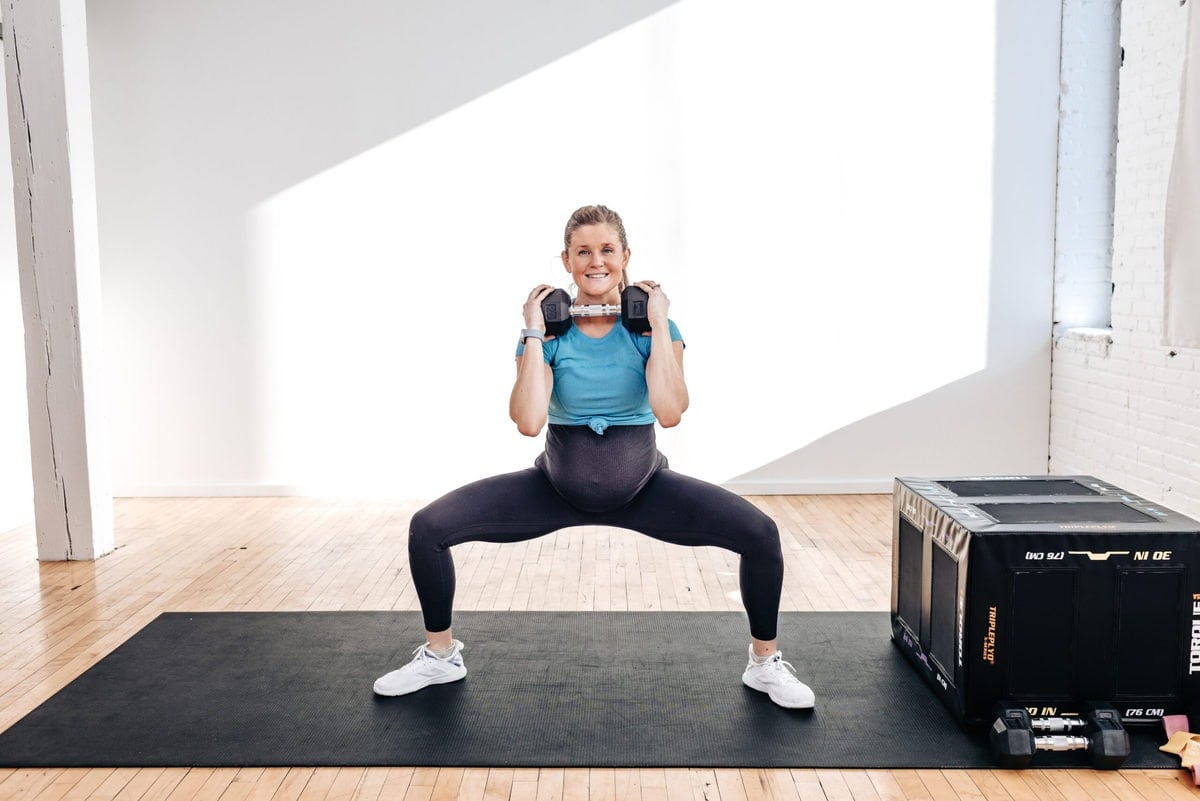
30-Minute Full Body Pregnancy Workout (Safe for Sciatica and SPD)
A challenging, full body strength workout that is safe for all trimesters of pregnancy. Exercise for pregnant women can sometimes aggravate SPD or sciatica pain – this prenatal workout is designed to be safe for pregnancy and pelvic pain.
I filmed this Full Body Pregnancy Strength Workout when I was pregnant with my daughter a few years ago, and to this day it is one of our most popular pregnancy workouts on YouTube.
Today’s NEW prenatal workout is a different format but same idea: a challenging, full body strength workout that can be adapted for the first, second AND third trimesters.
Sciatica and symphysis pubis dysfunction (SPD) pain is new for me in this third pregnancy. So as this pregnancy has progressed, I’ve had to modify exercises like lunges and single leg exercises.
In today’s pregnancy workout, we will keep our legs bilateral (both feet on the ground, no single leg or single-sided exercises) and avoid movements that may aggravate SPD or sciatica pain.
This challenging, full body pregnancy workout also includes moves to stabilize and strengthen the pelvic area and surrounding joints to reduce pain in the future.
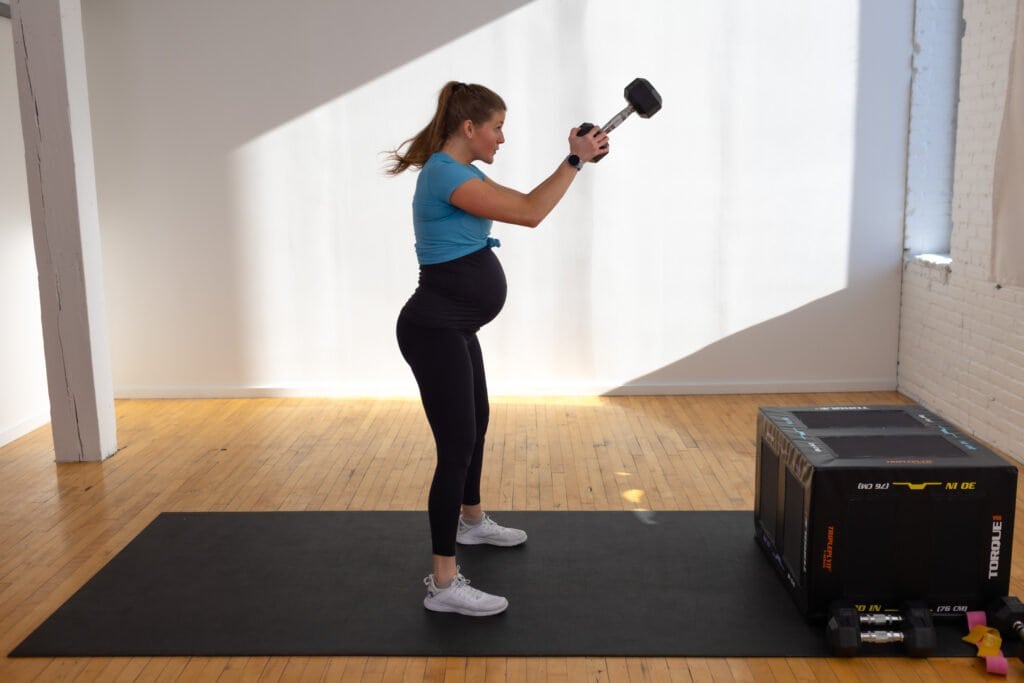
Exercise for Pregnant Women: FAQs
When it comes to exercise for pregnant women, strength training is the name of the game. This keeps you strong and ready for labor. I also like to include pelvic floor exercises and low-impact aerobics to my pregnancy workout plans. Prenatal yoga is another popular form of pregnancy exercise.
In general, you want to avoid forms of exercise that put you at higher risk of injury, especially during pregnancy when your center of gravity has shifted. Common examples of activities to avoid include scuba diving, horseback riding, downhill skiing and gymnastics. Additionally, it’s recommended you avoid activities that could cause abdominal trauma, like ice hockey, soccer or basketball. For more exercises to avoid during pregnancy check out this post: 5 Exercises to Avoid During Pregnancy (and pregnancy safe modifications).
Additionally, if you are experiencing SPD or pelvic girdle pain during pregnancy, avoid sheering movements that can make this pain worse: lunges, walking up stairs, single leg exercises (What To Expect).
Maintaining a regular exercise routine during pregnancy can reduce common aches, pains AND help you maintain strength to prepare for labor. Physical activity can reduce risk of pregnancy complications like gestational diabetes, bloating, swelling and back pain.
Listen to your body. I like to use the “talk test” – you want to make sure you would still be able to hold a conversation with a friend during your workout. Symptoms like chest pain, headache, dizziness and vaginal bleeding are signs you should stop and talk to your health care provider (Mayo Clinic).
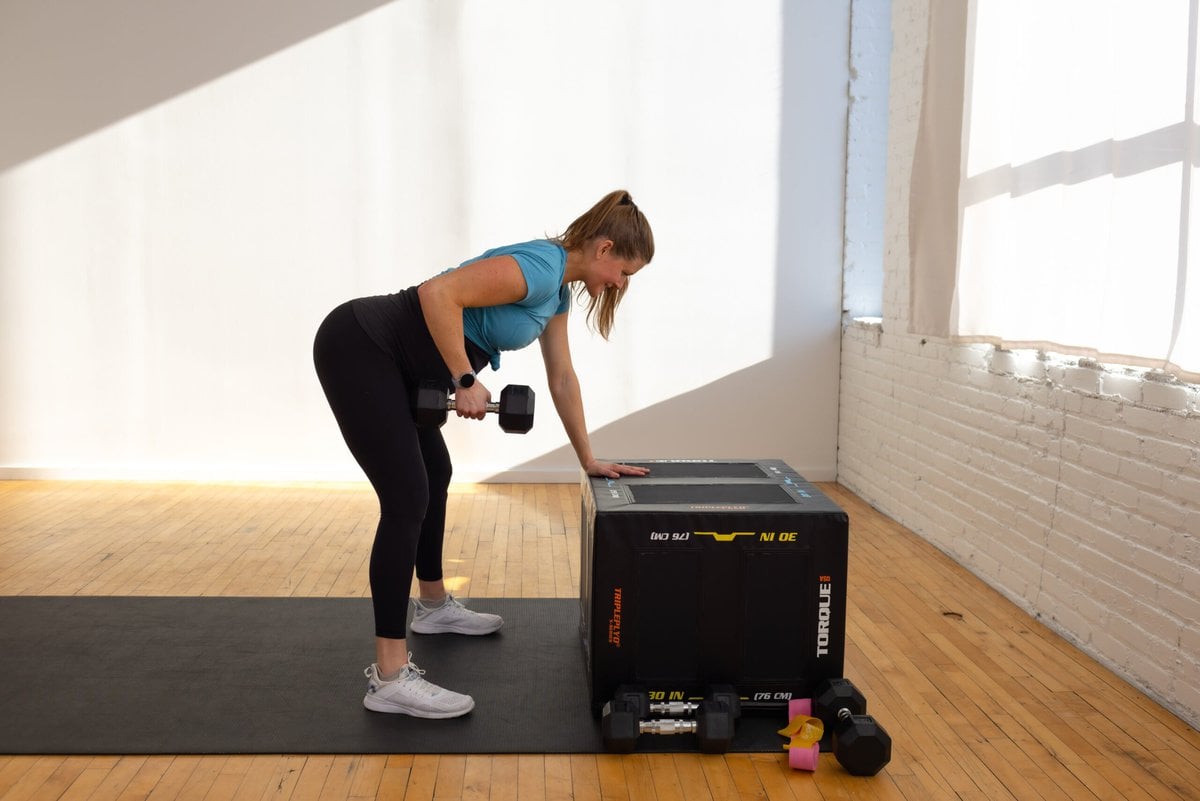
30-Minute Pregnancy Strength Workout
Stay strong throughout pregnancy with this safe and effective, 30 minute PREGNANCY STRENGTH workout!
This full body prenatal workout combines 11 of my favorite exercises for pregnant women. It is designed to safely build muscle and get your heart pumping, without aggravating common pregnancy issues like pelvic pain and SPD pain.
Add this full body strength workout to your pregnancy exercise program 1-2 times a week to maintain strength through the first trimester, second trimester and third trimester.
Workout Equipment:
Medium-to-heavy dumbbells and an optional bench.
I’m using 15 and 20 lb dumbbells. You also have the option to add a mini loop resistance band to increase the intensity of some exercises.
Workout Instructions:
Follow along with the guided Full Body Prenatal Strength Workout on YouTube, led by certified personal trainer and prenatal fitness instructor, Lindsey Bomgren.
Your Workout Looks Like This:
- 6 Circuits (2 exercises per circuit)
- Timed Intervals (45 seconds of work, 15 seconds rest; complete as many reps as you can in the timed interval)
- Repeat Each Circuit x2 Sets
Pregnancy Strength Workout with Dumbbells
CIRCUIT ONE: Legs
1. Banded Goblet Squats
2. Banded Lateral Walks
CIRCUIT TWO: Back
1. Banded Lat Pull Downs
2. Deadlift and Back Row
CIRCUIT THREE: Chest, Shoulders and Core
1. Incline Push Up and Shoulder Tap
2. 3 Second Bear Crawl Hold and Stand Up
CIRCUIT FOUR: Legs
1. Sumo Squat Hinge, Back Row and Clean Squat
2. Dumbbell Swings
CIRCUIT FIVE: Arms
1. 2 Bicep Curls and 1 Push Press
2. Kneeling Hip Thrust, Overhead Press and 2 Overhead Tricep Extensions
CIRCUIT SIX: Core Burnout
1. Banded Glute Bridge or Hip Thrust
11 Best Exercises for Pregnant Women
Banded Goblet Squats
Targets: Legs, glutes, quads, hamstrings, hip abductors, chest and core.
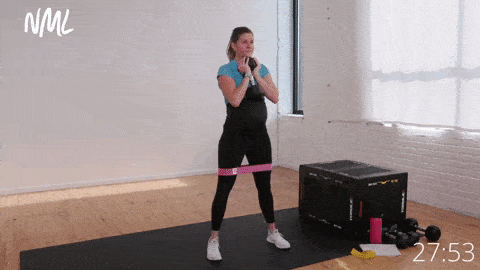
How To Do Banded Goblet Squats
- Place a resistance band six inches above your knees. Start standing, feet shoulder-width apart.
- Hold one dumbbell vertically at your chest in a goblet-hold.
- Bend your knees and sit your hips back (as if sitting down in a chair). Aim for 90-degree bends at each knee, focusing on pushing your knees out (not letting them cave in).
- Press through your heels to stand tall, driving your hips forward to return to standing.
Banded Lateral Walks
Targets: Glutes, specifically the gluteus medius (the outer part of your butt used for side-to-side movements), quads, hamstrings, and hip abductors.
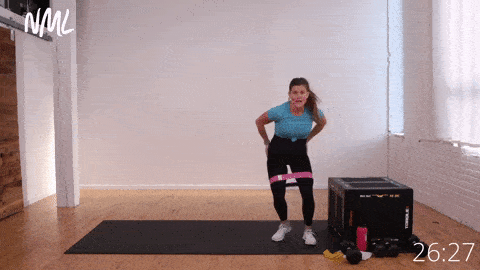
How To Do Banded Lateral Walks
- Place a resistance band six inches above your knees. Stand with your feet slightly wider than your hips to create tension across the band (activating your glutes).
- Bend your knees to lower down into a loaded squat position. Weight in heels, chest up.
- Hold this loaded squat position as you take two lateral steps to your right; stretching the band as far as you can.
- Tap your left foot in, bringing it towards your right foot, maintaining a low squat position.
- Then, take two lateral steps towards your left, maintaining tension across the band before bringing your right leg to the left to meet your outside foot.
Banded Lat Pull Downs
Targets: Arms and back, specifically the lats (the largest muscle in the upper body and biggest back muscle).
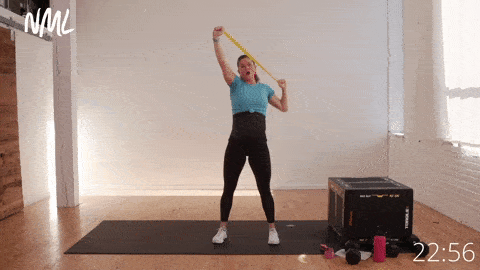
How To Do Banded Lat Pull Downs
- Start standing, feet under hips. Loop the resistance band between your thumbs and hold both hands overhead; arms fully extended overhead.
- Keeping your left hand steady, pull your right elbow down and out, engaging your back muscles and pulling your shoulder blade down. Right arm should pull down to a 90-degree bend, shoulder and elbow parallel.
- Slowly, release the tension, bringing your right hand back to the starting position with control.
- Then, repeat with your left arm, alternating sides with each pull down.
Deadlift and Back Row
Targets: The posterior chair or backside of the body: hamstrings, glutes, lower back, mid-upper back (lats), biceps and core.
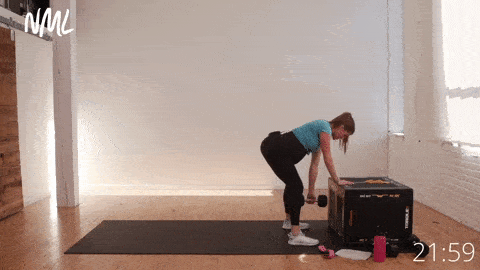
How To Do A Deadlift and Back Row
- Start with feet shoulder-width distance apart (or slightly wider as needed to make room for baby).
- Hold one dumbbell in your right hand, palm facing midline. Place your left hand on a box or bench for extra support if needed.
- Hinge at the hips until your torso is parallel to the floor (neck in line with your spine, flat back, belly pulled in).
- Hold this bent over position while performing a single arm row. Pull the dumbbell in your right hand back towards your right hip; squeezing your back muscles. Control the dumbbell back down to the starting position.
- Press through your heels to stand tall, returning to starting position.
Incline Push Up and Shoulder Tap
Targets: Chest, shoulders, triceps, back, abs, obliques and core muscles.
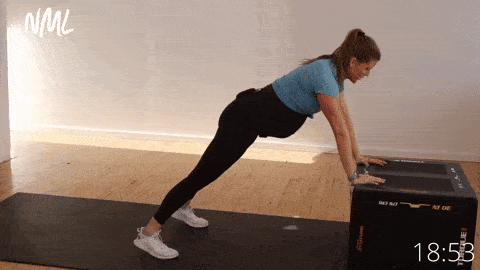
How To Do An Incline Push Up And Shoulder Tap
- Stand in front of your bench. The higher the surface, the easier the push up will be.
- Plant your hands on the bench and step back into a high plank position. Shoulders are stacked over wrists, neutral spine.
- Hold this incline plank position, maintaining a straight line with your body, as you slowly lower your chest towards the bench. Lead with your chest, elbows fall about 6 inches away from your body (not out to the sides).
- Once at the bottom of your push up, exhale as you push back up into high plank position.
- Perform a shoulder tap, bringing your right hand to tap your left shoulder.
- Complete another push up, then alternate your shoulder tap, bringing your left hand to meet your right shoulder.
3 Second Bear Crawl Hold And Stand
Targets: Deep transverse abdomen muscles, rectus abdomens (six-pack ab muscles), oblique muscles, shoulders, back, legs, glutes and quads.
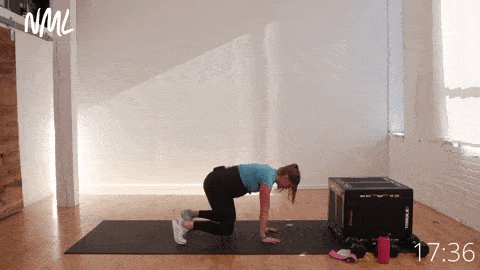
How To Do A 3 Second Bear Crawl And Stand
- Start in a table top position, quadruped on all fours, shoulders stacked over wrists and hips stacked over knees.
- Tuck your toes under and lift your knees one inch off the mat, finding a bear crawl position with abs engaged. Belly button drawn in towards spine. Hold for a three-count.
- Then, walk your hands back to meet your feet and plant your heels firmly on the ground.
- Drive through the heels to stand tall, raising your arms overhead before returning to start by finding a table top position, quadruped on all fours again.
Sumo Squat Hinge, Back Row and Clean Squat
Targets: Legs, glutes, hamstrings, hip adductors (inner thighs) and abductors (outer thighs), back and core.
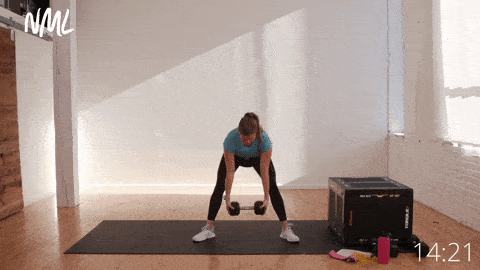
How To Do A Dumbbell Sumo Squat Hinge, Back Row and Clean Squat
- Start in a wide stance, feet outside of hips, heels in and toes pointed out (sumo squat stance). Hold one dumbbell horizontally in your hands between your legs.
- Hinge forward at the hips, then “row” the dumbbell towards your torso, pulling your elbows towards your ribcage then lowering with control.
- Return to standing, “cleaning” the dumbbell up towards your shoulders. Think about “getting under” the dumbbell to catch it — this is a dumbbell clean. Catch the dumbbell at your chest.
- Bend your knees to lower down into a sumo squat, pushing your knees out towards your outer three toes as you drop your hips parallel to your knees.
- Pause for a moment at the bottom of your sumo squat, then drive through your heels, squeezing your glutes and inner thighs to return to standing.
Dumbbell Swings
Targets: Entire posterior chain — glutes, hips, hamstrings, and all the stabilizing muscles in your back, shoulders and core.
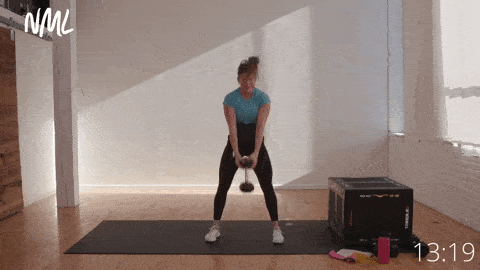
How To Do Dumbbell Swings
- Stand tall with your feet shoulder-width apart, toes facing forward. Hold one dumbbell vertically between both hands.
- With a slight bend in your knees and weight in your heels, hinge at your hips, pushing your butt back towards the wall behind you.
- Drive through your heels to stand tall, pushing your hips forward as you squeeze your glutes to swing the dumbbell up to shoulder height. Think long, loose arms (your arms are just a vehicle for moving the weight, your hips and glutes generate the power).
- As the dumbbell begins to descend, think of catching the weight with your hip hinge, loading the glutes and hamstrings.
2 Bicep Curls and 1 Push Press
Targets: Arms, biceps and shoulders.
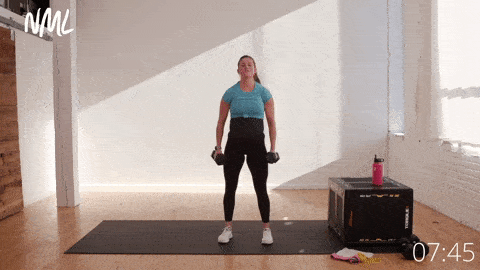
How To Do 2 Bicep Curls And 1 Push Press
- Start standing, holding a dumbbell in each hand, palms facing in towards each other.
- Squeeze your arms to curl the dumbbells up towards shoulder level. Focus on keeping your elbows in line with your body rather than letting them swing forward or back.
- With control, lower the dumbbells back down to starting position. Repeat for a total of two bicep curls.
- On the second curl, hold the dumbbells at your shoulder height and press straight overhead, performing an overhead shoulder press.
Kneeling Hip Thrust, Overhead Press and 2 Overhead Tricep Extensions
Targets: Hips, glutes, pelvic floor, shoulders, triceps and core.
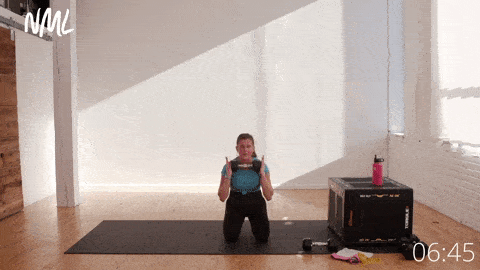
How To Do A Kneeling Hip Thrust, Overhead Press And 2 Overhead Tricep Extensions
- Start kneeling, knees under hips, toes curled underneath you, holding one dumbbell horizontally at your chest.
- Sit back onto your heels, then squeeze your quads and glutes to pull your body upright. As you thrust your hips forward (stacking hips over knees), push the dumbbell overhead directly above your shoulders, performing a shoulder press.
- Hold at the top of your shoulder press and perform two overhead tricep extensions by bending your elbows to lower the weight towards your head. Aim for 90-degree bends in each elbow.
- Return to the starting position and repeat.
Banded Glute Bridge
Targets: Glutes, hips, hamstrings, shoulders, back and triceps.
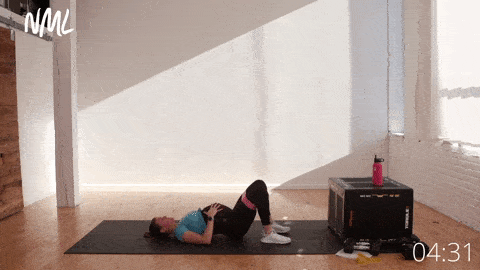
How To Do A Banded Glute Bridge
- Place a resistance band six inches above your knees. Start laying on your back, feet planted under knees.
- Press through your heels to lift your glutes off the mat, squeezing your glutes as you lift. This is a small, controlled movement.
- At the top of your glute bridge, press your thighs outward to increase tension on the band.
- Bring thighs back to starting position and lower your hips towards the mat.
Modification: If lying on your back is uncomfortable you can perform a hip thrust. Placing your shoulders and upper back on a bench or couch.
Pin this Full Body Prenatal Workout
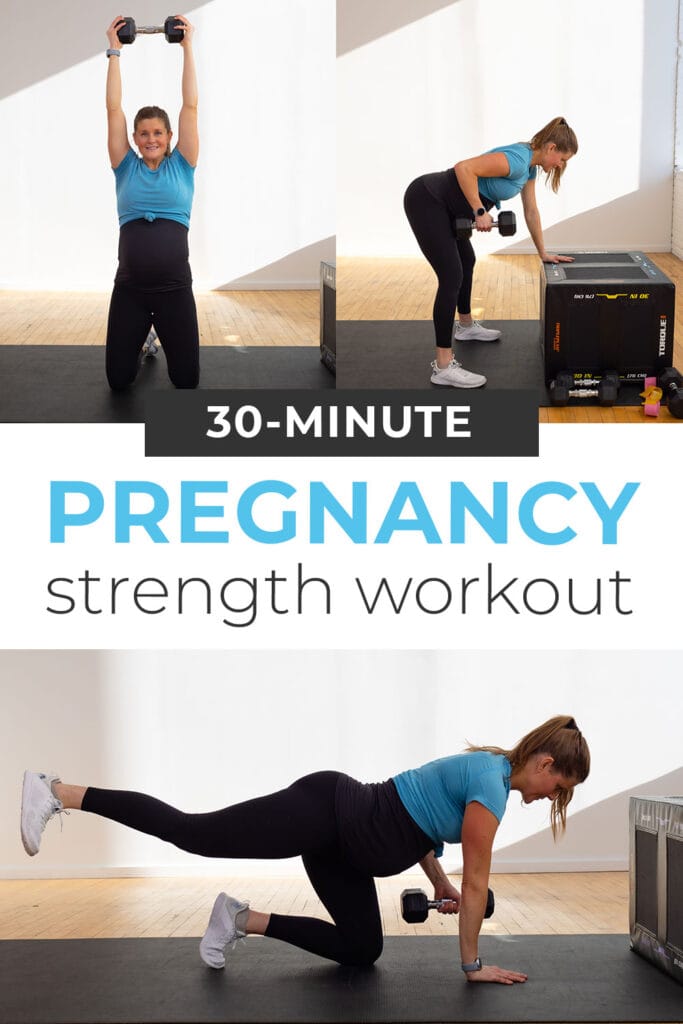










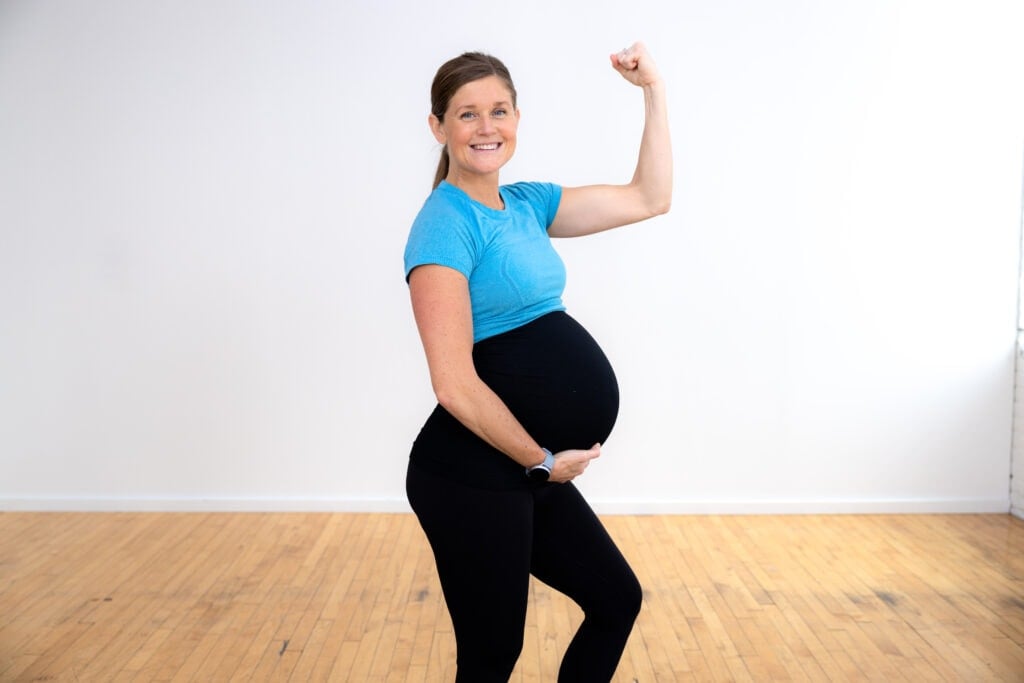
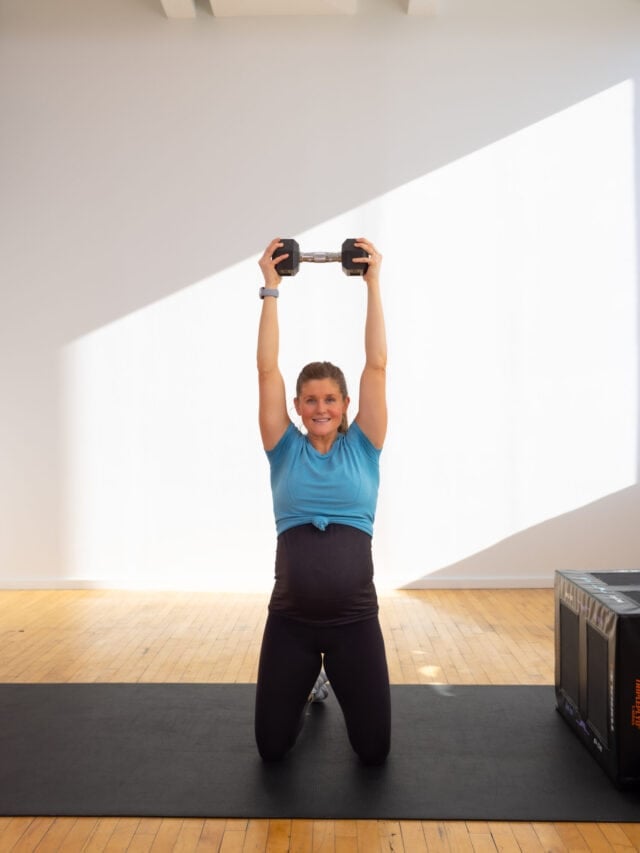
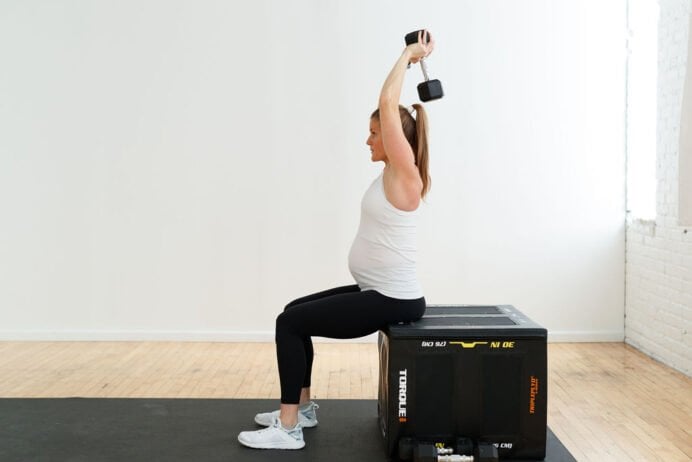
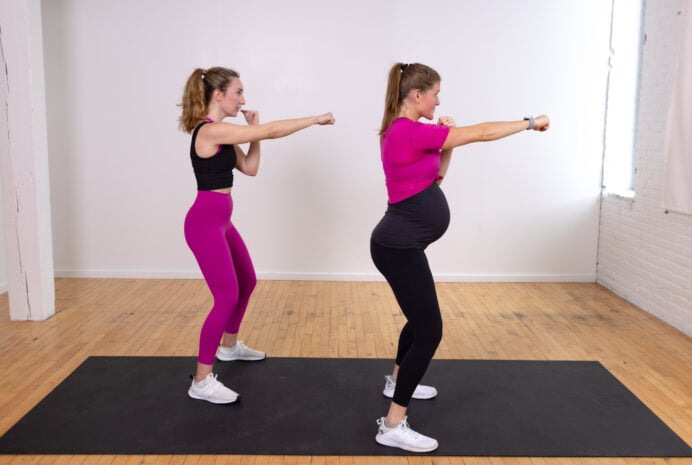
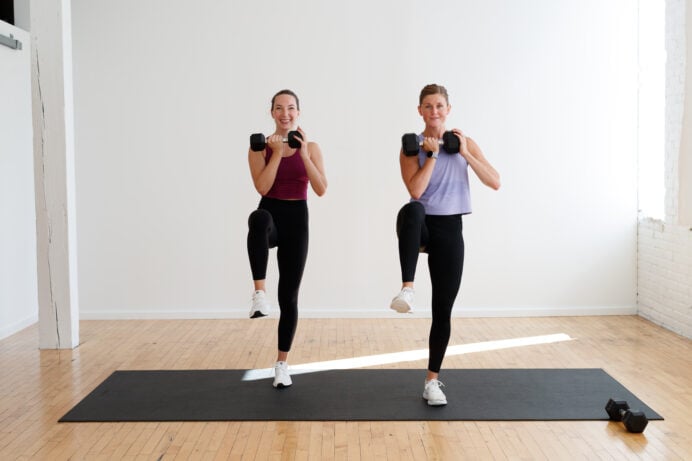
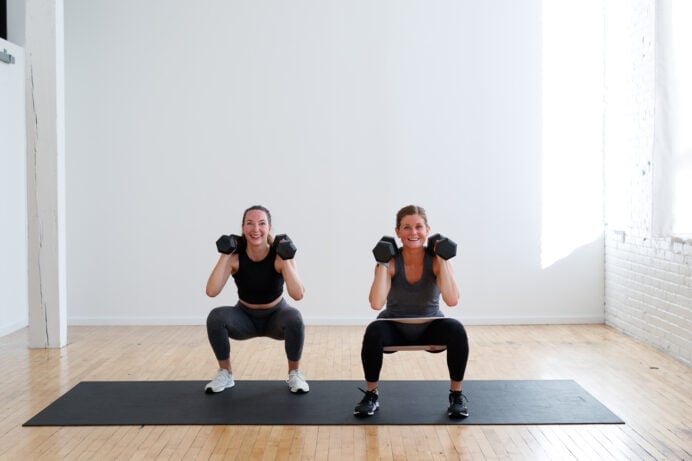
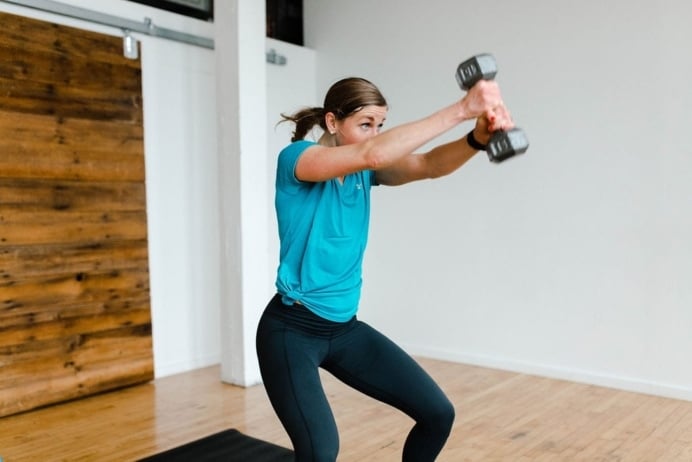
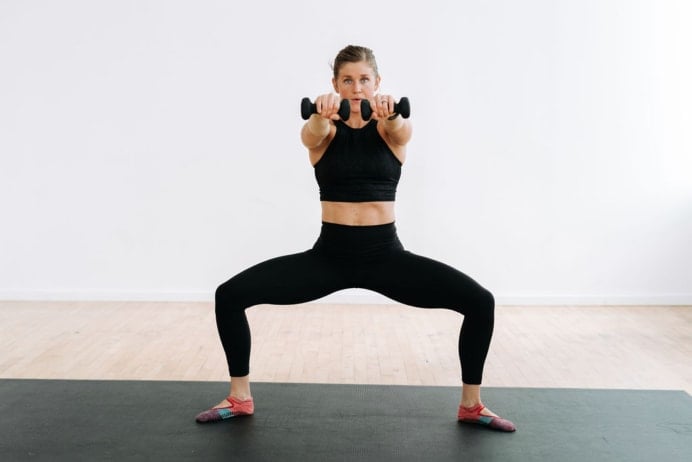
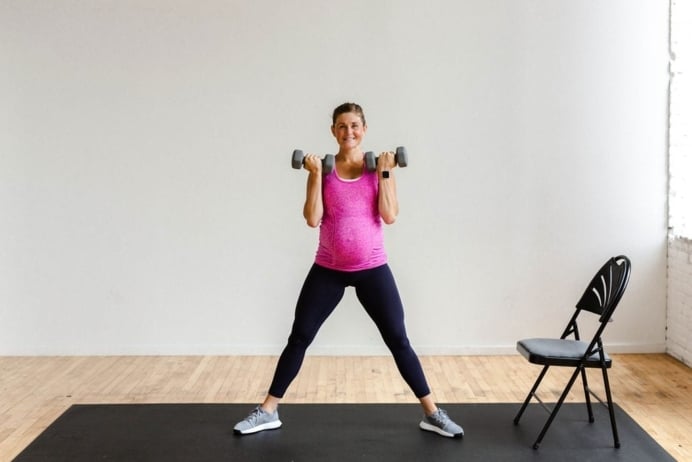
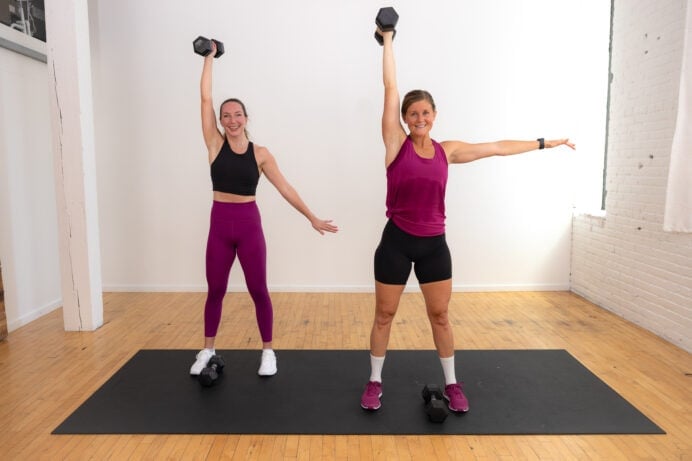


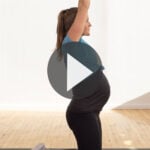
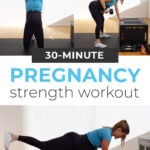
Thank you for the SPD friendly workout!! I have been struggling to workout because of the pain, but this is very helpful! I hope there are more videos like this to come as your progress to the end of your pregnancy! How have you been dealing with SPD pain? What is your workout regimen looking like now? I’m 28 weeks pregnancy and want to continue pushing myself but also struggle with the pain in my thighs and groin from SPD. Thank you!!
Hi Sarah! So glad you enjoyed this SPD friendly workout and YES — stay tuned we have a couple more like it coming soon! As well as stretches to help manage SPD and sciatica pain so more is coming. But really focusing on keeping both feet on the ground (bilateral movements; think of moving like mermaid). Keep up the great work mama! -Lindsey